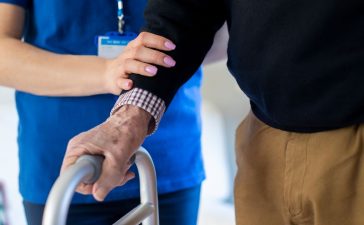In a landmark move, the NHS has today declared that millions of patients in dire need of mental health assistance can now seek help through the 111 service.
The expansion of NHS 111 to include mental health support for individuals of all ages, including children, has been met with approval from health chiefs. However, they have also expressed grave concerns about the high levels of unmet demand for mental health services.
This initiative positions England’s NHS as one of the first in the world to provide a comprehensive mental health crisis response via a single phone line, accessible 24/7. This is a significant shift from the previous system where local health services operated their own distinct helplines, which during the pandemic received approximately 200,000 calls each month.
Government officials have touted this development as part of their “plans to help fix the broken health system”. Starting Tuesday, those in England facing a mental health emergency, or worried about someone else, can dial 111 and choose the mental health option to connect with a trained professional.
Previously, local health systems managed separate helplines, fielding around 200,000 calls monthly. The staff managing the 111 service will now be equipped to arrange in-person community support or direct patients to alternative services.
Claire Murdoch, NHS England’s national mental health director, commented: “We know that record numbers of people are suffering with their mental health, and we want to ensure that when people are in crisis, they have easy, straightforward access to the support they need.
“While the NHS made significant progress during the pandemic with local services creating their own crisis phone lines, we want to go a step further by giving people everywhere in England one single point of access via NHS 111. And in doing so, I am extremely proud that we will become one of the first countries in the world to offer a free universal package of support to people through one easy to access phone line.
“The new integrated service can give people of all ages specialist mental health support and ensure they can be offered face-to-face support in a safe and therapeutic environment.”
Stephen Kinnock, minister of state for care, said: “As part of our plans to help fix the broken health system we want to ensure we give mental health the same attention and focus as physical health. For the first time, there is one number you can call whether you are feeling physically unwell or worried about your mental health to access the support you might need.”
Mark Winstanley, chief executive of Rethink Mental Illness, commented on the initiative saying: “A mental health crisis is traumatic and disorientating, and getting help as quickly as possible is vital. The last thing people need when they or a loved one is in crisis, is uncertainty about where to turn.
“Today, the NHS have made it easier to access urgent support via 111, building on provision already in place through crisis lines. We welcome this important step, and hope it will make it simpler for people to access the help they need.”
However, Saffron Cordery, deputy chief executive of NHS Providers, expressed her concerns about the strain on services. She stated: “With record numbers of people experiencing mental ill health, any measures which help people access the care they need quickly and easily are to be welcomed.
“This announcement builds on much needed investment in mental health crisis and liaison services in recent years, and efforts by trusts to create alternatives to emergency departments for people experiencing a crisis.
“However, trusts remain deeply concerned about levels of unmet need for those seeking mental health care with the latest national data showing over 350,000 children and young people and almost 250,000 adults are waiting for treatment from community mental health services. They also know that demand and persistent pressure on NHS 111 services, many of which are run by already stretched ambulance services, is much higher than before the pandemic.
“It is vital that trusts and their local partners such as schools, local authorities, and the voluntary sector are given the funding they need to deliver on ambitions around crisis care pathways for people of all ages as well as helping individuals before they reach crisis point. We also need to address other underlying issues, such as the wider determinants of mental ill health, which are driving pressures on services, and the rising severity and complexity of people’s needs when they contact the NHS.”











